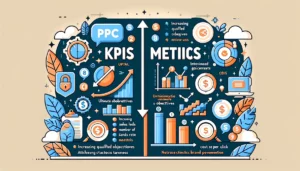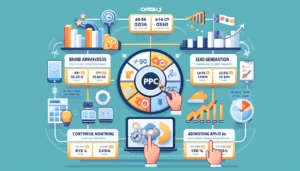The Ultimate Guide to Choosing the Right PPC KPI for Your Campaign Goals

Choosing the Right PPC KPI for Your Campaign goals is crucial for maximising the effectiveness of your advertising efforts. KPIs, or key performance indicators, act as a compass, guiding your strategy and helping you measure success. This ultimate guide will walk you through the process of selecting the most relevant KPIs based on your specific campaign objectives, ensuring that you can make data-driven decisions for optimal results.
Key Takeaways for Choosing the Right PPC KPI for Your Campaign
- There’s no single most important PPC KPI; the key metric depends on your campaign’s specific goals.
- Creative ad copy and compelling landing pages are critical, but understanding KPIs plays a more prominent role in maximising ROI and engagement.
- It’s essential to tailor KPIs and metrics according to the specific stage of the marketing funnel your campaign targets.
- Understanding the distinction between KPIs and metrics is crucial for setting up successful campaigns.
- Regularly monitoring KPIs helps in optimising campaigns, demonstrating value to stakeholders, and making data-informed decisions.
Understanding the Importance of PPC KPIs
Defining KPIs in PPC
Understanding the distinction between PPC KPIs and metrics is crucial for setting up successful campaigns. KPIs represent the ultimate objectives you aim to achieve. Conversely, metrics are the specific data points that track your progress toward these objectives. For instance, if increasing qualified leads is your goal, relevant metrics might include the conversion rate or the number of new users visiting a particular webpage.
Why KPIs Matter for Your Campaign
Creative ad copy and compelling landing pages are critical for success, but understanding the effectiveness of your PPC campaigns through KPIs plays a more prominent role. KPIs or key performance indicators act as your compass, guiding you toward maximising ROI and engagement. But with many metrics available, how do you know which ones truly matter?
We have shortlisted the 10 most crucial paid search KPIs to monitor for running a series of successful PPC campaigns.
Common Misconceptions About Choosing the Right PPC KPI for Your Campaign
Regularly monitoring these metrics is essential for:
- Understanding campaign performance: KPIs provide insights into your audience engagement, conversion rates, and overall return on ad spend (ROAS).
- Optimising your campaigns: By identifying underperforming areas, you can adjust bids, keywords, and landing pages to maximise efficiency and results.
- Demonstrating campaign value: KPIs are invaluable for reporting progress to stakeholders and justifying your PPC budget allocation.
It’s easy to confuse metrics with KPIs, but remember that while all KPIs are metrics, not all metrics are KPIs. Focus on the indicators that align with your campaign goals for the best results.
Aligning PPC KPIs with Your Campaign Goals
Identifying Your Campaign Objectives
PPC campaigns serve various purposes, so it’s important to understand how KPIs and metrics differ. Choosing the right KPIs for your business and connecting them to appropriate metrics is vital for success. Often, people use the same goals for all campaigns, regardless of where they fit in the marketing funnel. However, it’s more effective to customise goals and metrics according to the specific funnel stage. This approach allows for a more precise measurement of campaign performance.
Choosing Relevant KPIs for Different Goals
Your PPC campaigns’ key performance indicators (KPIs) must be closely linked to your business goals. The metrics chosen to evaluate these KPIs should be based on your business’s specific nature and the structure of your campaigns. Understanding the distinction between PPC KPIs and metrics is important for setting up successful campaigns. KPIs represent the ultimate objectives you aim to achieve. Conversely, metrics are the specific data points that track your progress toward these objectives. For instance, if increasing qualified leads is your goal, relevant metrics might include the conversion rate or the number of new users visiting a particular webpage.
Examples of Goal-Specific KPIs
Regularly monitoring these metrics is essential for:
- Understanding campaign performance: KPIs provide insights into your audience engagement, conversion rates, and overall return on ad spend (ROAS).
- Optimising your campaigns: By identifying underperforming areas, you can adjust bids, keywords, and landing pages to maximise efficiency and results.
- Demonstrating campaign value: KPIs are invaluable for reporting progress to stakeholders and justifying your PPC budget allocation.
Tailoring KPIs and metrics for effective PPC management is crucial for aligning your efforts with your company’s mission and objectives.
Choosing the Right PPC KPI for Your Campaign: PPC KPIs for Brand Awareness Campaigns
Impression Share is a critical KPI for brand awareness campaigns. It measures the percentage of times your ads are shown out of the total available impressions. A high impression share indicates strong visibility in your target market. To improve this metric, ensure your bids and budgets are competitive and your ad quality is high.
Reach and Frequency are essential metrics for understanding how many unique users see your ads and how often they see them. Reach measures the total number of unique users exposed to your ads, while frequency indicates the average number of times these users see your ads. Balancing these metrics helps in avoiding ad fatigue and ensuring broad visibility.
Brand Recall Metrics gauge how well users remember your brand after being exposed to your ads. Surveys and brand lift studies are common methods to measure this. These metrics are crucial for understanding the long-term impact of your PPC campaigns on brand awareness.
Regularly monitoring these metrics is essential for understanding campaign performance, optimising your campaigns, and demonstrating campaign value to stakeholders.
Essential KPIs for Lead Generation Campaigns
Cost Per Lead (CPL)
Cost Per Lead (CPL) is a critical metric for any lead generation campaign. It helps you understand how much you’re spending to acquire each lead. A lower CPL indicates a more cost-effective campaign. To calculate CPL, use the formula:
CPL = Total Costs / Number of Leads
Monitoring CPL allows you to adjust your budget and strategies to ensure you’re getting the most out of your investment.
Lead Quality Metrics
While generating a high number of leads is important, the quality of those leads is equally crucial. Lead quality metrics help you determine how likely your leads are to convert into paying customers. Metrics to consider include:
- Lead-to-Customer Conversion Rate
- Engagement Level
- Lead Scoring
By focusing on lead quality, you can ensure that your sales team spends time on leads that are more likely to result in a sale.
Conversion Rate Choosing the Right PPC KPI for Your Campaign
Conversion rate is the percentage of visitors who complete a desired action, such as filling out a form or making a purchase. A higher conversion rate indicates a more effective campaign. To calculate conversion rate, use the formula:
Conversion Rate = (Number of Conversions / Number of Visitors) * 100
Improving your conversion rate can significantly impact your overall campaign performance, making it a key KPI to monitor.
Focusing on these essential KPIs will help you optimise your lead generation campaigns, ensuring you attract high-quality leads at a reasonable cost.
Key KPIs for Sales-Focused PPC Campaigns
Return on Ad Spend (ROAS)
Return on Ad Spend (ROAS) is a critical metric for any sales-focused PPC campaign. It measures the revenue generated for every pound spent on advertising. A high ROAS indicates that your campaign is effective in driving sales relative to its cost. To calculate ROAS, divide the total revenue by the total ad spend. For example, if you earned £10,000 from a campaign that cost £2,000, your ROAS would be 5.
Customer Acquisition Cost (CAC)
Choosing the Right PPC KPI for Your Campaign: customer Acquisition Cost (CAC) helps you understand how much it costs to acquire a new customer through your PPC efforts. This metric is essential for evaluating the efficiency of your campaigns. To calculate CAC, divide the total cost of your PPC campaign by the number of new customers acquired. A lower CAC indicates a more efficient campaign.
Sales Conversion Rate
Sales Conversion Rate is the percentage of clicks on your PPC ads that result in a sale. This KPI is crucial for assessing the effectiveness of your ad copy and landing pages. To calculate the Sales Conversion Rate, divide the number of sales by the number of clicks and multiply by 100. For instance, if you had 50 sales from 1,000 clicks, your conversion rate would be 5%.
Regularly monitoring these metrics is essential for understanding campaign performance, optimising your campaigns, and demonstrating value to stakeholders.
Tools and Techniques for Tracking PPC KPIs
Using Google Analytics for PPC
Google Analytics is an indispensable tool for tracking PPC KPIs. It allows you to measure metrics such as clicks, impressions, click-through rate (CTR), and conversion rate in real-time. By integrating Google Analytics 4 with your PPC campaigns, you can gain comprehensive insights into user behaviour and campaign performance. This enables you to make data-informed decisions to optimise your campaigns for better results.
Setting Up KPI Dashboards
Creating KPI dashboards is essential for visualising your PPC performance metrics. These dashboards can be customised to display the most relevant KPIs for your campaign goals. Use tools like Google Data Studio or Tableau to build interactive and dynamic dashboards. This way, you can monitor key metrics at a glance and quickly identify trends or issues that need attention.
Automating KPI Reports
Automating KPI reports can save you time and ensure that you have up-to-date information at your fingertips. Tools like Supermetrics or Google Sheets can be used to automate the collection and reporting of PPC data. Set up automated reports to be delivered to your inbox at regular intervals, so you can stay on top of your campaign performance without manual effort.
Consistent tracking and reporting of PPC KPIs are crucial for the ongoing optimisation of your campaigns. By leveraging the right tools and techniques, you can ensure that your PPC efforts are both effective and efficient.
Optimising Your PPC Campaigns Based on KPI Insights
Identifying Underperforming Areas
Regularly monitoring these metrics is essential for:
- Understanding campaign performance: KPIs provide insights into your audience engagement, conversion rates, and overall return on ad spend (ROAS).
- Optimising your campaigns: By identifying underperforming areas, you can adjust bids, keywords, and landing pages to maximise efficiency and results.
- Demonstrating campaign value: KPIs are invaluable for reporting progress to stakeholders and justifying your PPC budget allocation.
Adjusting Bids and Keywords when Choosing the Right PPC KPI for Your Campaign
Adjust bidding strategies based on the intelligence gathered from KPI monitoring. Remember, the analytics of PPC advertising go beyond mere number-crunching. They offer a narrative of user engagement and behaviour and insights into the overall health and efficacy of your campaigns. Your ability to not just collect but also interpret these metrics and translate them into actionable strategies is what will set your PPC efforts apart and drive your business towards lasting growth and success.
Improving Landing Page Performance
Creative ad copy and compelling landing pages are critical for success, but understanding the effectiveness of your PPC campaigns through KPIs plays a more prominent role. KPIs or key performance indicators act as your compass, guiding you toward maximising ROI and engagement. But with many metrics available, how do you know which ones truly matter?
Tailoring KPIs and metrics for effective PPC management is crucial. Your PPC campaigns’ key performance indicators (KPIs) must be closely linked to your business goals. The metrics chosen to evaluate these KPIs should be based on your business’s specific nature and the structure of your campaigns.
Conclusion on Choosing the Right PPC KPI for Your Campaign
Choosing the right PPC KPI for your campaign goals is not a one-size-fits-all endeavour. It requires a deep understanding of your specific objectives and how different metrics align with them. By focusing on the KPIs that matter most to your goals—whether it’s brand awareness, lead generation, or sales—you can effectively measure and optimise your campaigns for success. Remember, the key to a successful PPC strategy lies in continuously monitoring and adjusting your KPIs to reflect your evolving business needs and market conditions. With the insights provided in this guide, you’re now equipped to navigate the complex landscape of PPC metrics and drive your campaigns toward achieving maximum impact.
Frequently Asked Questions for Choosing the Right PPC KPI for Your Campaign
What are PPC KPIs and why are they important?
PPC KPIs, or Pay-Per-Click Key Performance Indicators, are metrics used to measure the effectiveness of PPC campaigns. They are crucial because they help you understand how well your campaigns are performing and guide you in making data-driven decisions to optimise for better results.
How do I choose the right PPC KPIs for my campaign goals?
Choosing the right PPC KPIs depends on your specific campaign goals. For instance, if your goal is brand awareness, you might focus on impression share and reach. For lead generation, cost per lead (CPL) and conversion rate are more relevant. Align your KPIs with your campaign objectives for the best results.
What is the difference between KPIs and metrics in PPC?
KPIs are the key performance indicators that represent your primary objectives, such as increasing qualified leads or improving ROI. Metrics, on the other hand, are the specific data points that track your progress toward these KPIs, such as conversion rate or click-through rate (CTR).
Choosing the Right PPC KPI for Your Campaign: Can I use the same KPIs for all my PPC campaigns?
It’s not advisable to use the same KPIs for all PPC campaigns because different campaigns have different objectives. Tailoring your KPIs to match the specific goals of each campaign will provide more accurate insights and help you optimise more effectively.
How can I track my PPC KPIs effectively?
You can track your PPC KPIs effectively using tools like Google Analytics, which allows you to monitor metrics in real-time. Setting up KPI dashboards and automating KPI reports can also help you stay on top of your campaign performance and make timely adjustments.
What should I do if my PPC campaign is underperforming based on KPI insights?
If your PPC campaign is underperforming based on KPI insights, identify the areas that need improvement. This could involve adjusting bids and keywords, improving your ad copy, or enhancing your landing page performance. Regular monitoring and optimisation are key to turning around underperforming campaigns. If in doubt you should book in for your 100% free PPC audit.
Author
Search Blog
Free PPC Audit
Subscribe to our Newsletter
The Voices of Our Success: Your Words, Our Pride
Don't just take our word for it. With over 100+ five-star reviews, we let our work-and our satisfied clients-speak for us.
"We have been working with PPC Geeks for around 6 months and have found Mark and the team to be very impressive. Having worked with a few companies in this and similar sectors, I rate PPC Geeks as the strongest I have come across. They have taken time to understand our business, our market and competitors and supported us to devise a strategy to generate business. I value the expertise Mark and his team provide and trust them to make the best recommendations for the long-term."
~ Just Go, Alasdair Anderson



